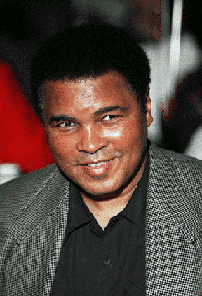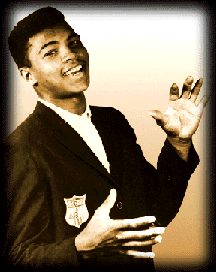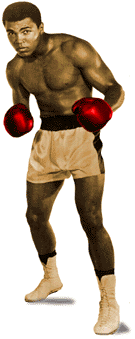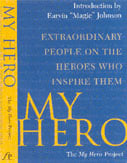 |
Was it his physical prowess, his social commentary, his clever, cocky rhymes? Or was it his post boxing, humanitarian endeavors? Maybe it's all of the above for many who have been inspired, uplifted, and touched by the greatest champion of all time, Muhammad Ali.
Muhammad Ali has undoubtedly been a fixture in world culture since the 1960's. Seizing the gold medal at the Olympics in 1960, battling George Foreman in "The Rumble in the Jungle" in Zaire, and going head to head with Joe Frazier in "The Thrilla in Manila" in the Philippines, were highlights of a career that earned Ali the status of world icon. Since his retirement in 1981, Ali has engaged in many humanitarian endeavors, including a 1990 journey to Iraq to negotiate the release of 15 hostages. In the last 20 years, Ali's cultural status has hardly diminished: 3 billion television viewers around the world watched him open the Atlanta Olympics in 1996.
Inspiring billions has been an arduous work in progress for Ali. Many Americans were slighted by his brazen "I am the greatest" anthem. White America couldn't fathom a black man being so presumptuous. These same Americans were also enraged by Cassius Clay's insistence on relinquishing what he called his "slave name" for the Muslim name, Muhammad Ali. "I don't have to be what you want me to be; I'm free to be what I want," Ali said of his name change.
 |
The relationship did not improve much when Ali spoke out against Vietnam, refusing to join the Army during the war. His short defense "I ain't got no quarrel with them Viet Cong" spoke volumes, but the media vilified him. The government prosecuted him for draft dodging, and the boxing commission took away his license. He was idle for three and a half years during what should have been the peak of his career.
Ali's return to boxing was a spectacular one. He regained his title in 1974, knocking out tough guy George Foreman in the eighth round in the famed "Rumble in the Jungle." This widely-publicized fight became a permanent chapter in boxing history.
Ali wrote of this fight:
"'The Rumble in the Jungle' was a fight that made the whole country more conscious. I wanted to establish a relationship between American blacks and Africans. All the time I was there, I'd travel to the jungles, places where there was no radio or television, and people would come up and touch me, and I could touch them. The fight was about racial problems, Vietnam. All of that."
 |
Although "The Rumble in the Jungle" could not hold a torch to 1975's "Thrilla in Manila," a battle with Joe Frazier, (which Ali also won) "The Rumble in the Jungle" stands out among other sporting events for its social impact and lasting effect on Ali himself. Still ferocious in the ring, Ali's meeting with the people of Africa had added another dynamic to his personality: compassion. Ali has --sometimes anonymously--donated millions of dollars to a variety of individuals and organizations transcending race and class barriers. Not bad for a man maligned for his religious affiliation.
In 1984, it was revealed that the man the Kentucky Senate has named "the greatest athlete of all time" was stricken with Parkinson's disease. But true to form, Ali hasn't let his illness stop him from being free to do what he wants.
Never has a sports figure inspired so many people in so many different directions. Ali has shown that a sport can be more than entertainment; it can also be a cultural event with the power to change social values. And he has shown that a black man can stand up to social oppression.
Page created on 6/9/2004 4:53:09 PM
Last edited 6/9/2004 4:53:09 PM

For a limited time, you may read Muhammad Ali's essay on Nelson Mandela by clicking here.
